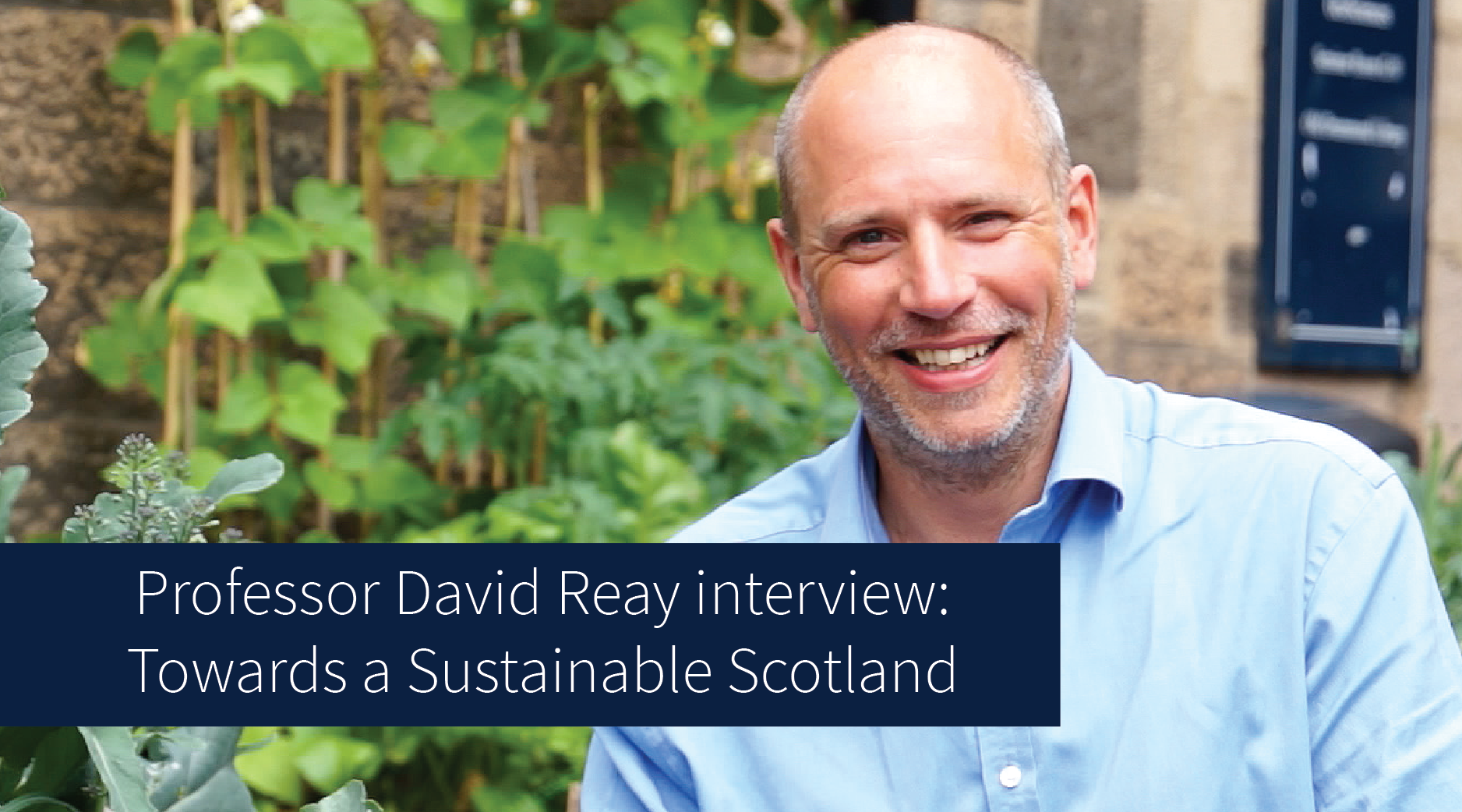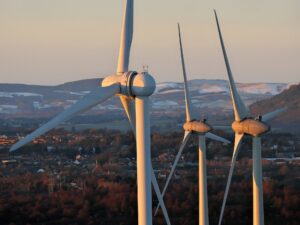Professor David Reay interview: Towards a Sustainable Scotland

As part of their MSc in Science Communication and Public Engagement and in light of Glasgow hosting COP 26, MSc Science Communication students, Beth Bryan, Megan Glatzel, Katie Smith, and Li Zhang, sought to produce a case study highlighting ongoing projects at the University relating to green recovery from Covid-19.
As we finally begin to ease restrictions and emerge from the pandemic, we have an opportunity to ensure that the future economy is robust, resilient and sustainable. Professor David Reay and Dr Sarah Birrell Ivory, two senior academics involved in related research, spoke to us about their vision for both Edinburgh and Scotland.
Read the interview with Dr Sarah Birrell Ivory
Professor David Reay is the current chair in carbon management and education in the School of Geosciences at the University of Edinburgh, Executive Director at the Edinburgh Climate Change Institute and the Direct of Policy for the ClimateXChange. Reay is also an author of the influential ‘Forward, Faster, Together’ report, detailing a set of principles to guide thinking around coronavirus recovery within Edinburgh.
Edinburgh Climate Change Institute
What impact do you think that the Covid-19 pandemic has had on Scotland’s ability to achieve emissions reduction?
I think time will tell. Right now, we can see the short-term emission reductions because we’ve not been travelling as much and the energy use in many offices has gone right down. I think the key thing is whether Covid-19 has delayed climate change action which was planned before. There is the danger that we purely focus on economic recovery without considering the bigger issues. I am currently confident that the pandemic will strengthen us here in Scotland in terms of our climate action.
Regarding policy, the Scottish Government continues to be overt in relation to their climate considerations. Despite Covid-19 changing the context of everything, it has not altered the goals required to meet net-zero by 2045. Additionally, the green recovery narrative is another one that runs strongly through where spending is allocated. The Scottish Government has also been quick to acknowledge that young people and minority communities were already unequally impacted by our economic system and our country and Covid-19 has exacerbated this.
Therefore, it is crucial that recovery from the pandemic is seen as an opportunity to address these inequalities in a way that aligns with net-zero and a climate-neutral future. I am not a government spokesperson, but they do talk a good talk and they actually walk a good walk in a lot of these things. To summarise the impact of Covid on climate action in Scotland, I think it has focussed minds even though you might assume the opposite.
What do you see as the biggest challenge for being able to implement the green recovery across all of Scotland?
 The biggest challenge is the ‘all’ word. It is about achieving green recovery and the net-zero recovery which involves all of Scotland. We need to ask: “what will work for people?” and address issues through a place-based lens, accounting for the diversity of our regions and communities. The population in Scotland want climate action and in some places, the government needs to catch up. But that requires action from both local and central government, the private sector, and other organisations.
The biggest challenge is the ‘all’ word. It is about achieving green recovery and the net-zero recovery which involves all of Scotland. We need to ask: “what will work for people?” and address issues through a place-based lens, accounting for the diversity of our regions and communities. The population in Scotland want climate action and in some places, the government needs to catch up. But that requires action from both local and central government, the private sector, and other organisations.
The biggest challenge is how you achieve that in a diverse country, albeit a small one, where we do have lots of issues of inequality. It requires ensuring that we live up to this ‘just transition’ phrase. People are going to lose their jobs because of necessary changes to tackle climate change and that is hard, this is people’s livelihoods. It would be great to be in Scotland in 2045 with net-zero emissions and also in a country that is fairer and more equitable, where jobs are more rewarding, and where people’s health is better supported.
If we do this, or anywhere close to it, then that is an exemplar for every nation in the world, particularly post-industrial nations like ours. If Scotland can do it, then it can be a model for other areas. We have always been a small but international country, and this is our time to live up to the rhetoric of being world-leading. It’s a challenge that I think we can meet. The global context has changed radically for the better in the last six months and there’s a lot to be optimistic about.
Moving towards sustainability more generally, what is a good example of something that Scotland has done to show leadership in this area?
 On the practical front, we have really expanded our renewable energy, we don’t have any coal-based energy in Scotland anymore. Scotland is a world-class example of how you can transition away from fossil fuels. I also think another example is how we deal with climate policy in Scotland. In every parliamentary discussion the question ‘what about climate change?’ is posed.
On the practical front, we have really expanded our renewable energy, we don’t have any coal-based energy in Scotland anymore. Scotland is a world-class example of how you can transition away from fossil fuels. I also think another example is how we deal with climate policy in Scotland. In every parliamentary discussion the question ‘what about climate change?’ is posed.
We have some really good transferable models working in our small but diverse country. As well as the practical action which has mainly been about the energy transition, a lot of it has been about the capacity building and governance and the political structures aligning with what is required to deliver net-zero which cannot be an add on. Every sentence must end with “what does this mean for climate change?”
To bring it back down to a more local level, what role do you think that the University of Edinburgh will play in assisting the Edinburgh City councils’ goal of being carbon neutral even earlier by 2030?
The university has a vital role; the city won’t be able to do it without us. We are one of the biggest energy users, largest landowners, and biggest emitters in the city so if the University of Edinburgh doesn’t do enough then they are in trouble. One of the strongest ways we are engaging is through the climate commission, which Edinburgh university helped to set up.
I sit on this representing the University of Edinburgh and it represents a lot of the key stakeholders within the city region in terms of delivering on the net-zero plans and helping the council do this. From a sharing good practice and shared commitment point of view, we have an Edinburgh pact committing all of our organisations to more action.
We are also one of the biggest employers and a lot of Edinburgh residents are connected to the university in some way. We do a huge amount of climate change research and provide a lot of understanding about not just the technology which will help us decarbonise the city, but more importantly, how you implement it, who pays for it, and how issues around inequality are addressed. However, we can do much more than just the size of our organisation through our research, our staff and students, and our capacity for training. We can help a lot of organisations with the tools they need to make the change.
We read the Edinburgh Climate Commission’s ‘Forward, Faster, Together’ report on how the city can combine Covid-19 recovery and emissions reductions goals, and there are a lot of great suggestions there on how to move Edinburgh forward in the green recovery. What do you see as the short-term priorities?
![The Grassmarket [Chris Close]](https://blogs.ed.ac.uk/sustainability/wp-content/uploads/sites/1392/2021/11/Edinburgh-Uni-8002704Grassmarket-Chris-Close-small-300x200.jpg) The immediate ones are the practical steps to make active travel easier and safer, things like the widening of pavements and constraint of traffic. Another is around education for climate action. I wrap into that the skills, in terms of oil and gas workers and government workers, on how to implement a climate change plan and everything you learn as an Edinburgh student. Being able to know that whatever subject you are in, you will leave with an understanding of climate change and why it’s important to you.
The immediate ones are the practical steps to make active travel easier and safer, things like the widening of pavements and constraint of traffic. Another is around education for climate action. I wrap into that the skills, in terms of oil and gas workers and government workers, on how to implement a climate change plan and everything you learn as an Edinburgh student. Being able to know that whatever subject you are in, you will leave with an understanding of climate change and why it’s important to you.
A key one as a city, is to say how do we as educational institutions provide education now and is it fit for net-zero and the climate emergency? I think at present the answer would be no. We need to look at our curriculum and work with employers to assess what skills are in demand. Not just the climate ones, but the skills around digital and project management which will help with employment. We should do it in a way where, as an Edinburgh ecosystem, we are producing graduates from our university who get climate change, are massively employable and, this sounds cheesy, who are good global citizens.
That has always been our raison d’etre as a university: to make the world a better place and we do that through you, the students. A fundamental part of that as ambassadors for Edinburgh and the university is that you are good global citizens, but if you look at our current curriculum, you could leave Edinburgh and not have thought or heard about climate change or sustainability and we need to fix that.
Go further
- Find out about the University as a Living Lab
- COP 26 resources, including summaries of research and action
- Read more interview blog posts with academics





1 replies to “Professor David Reay interview: Towards a Sustainable Scotland”